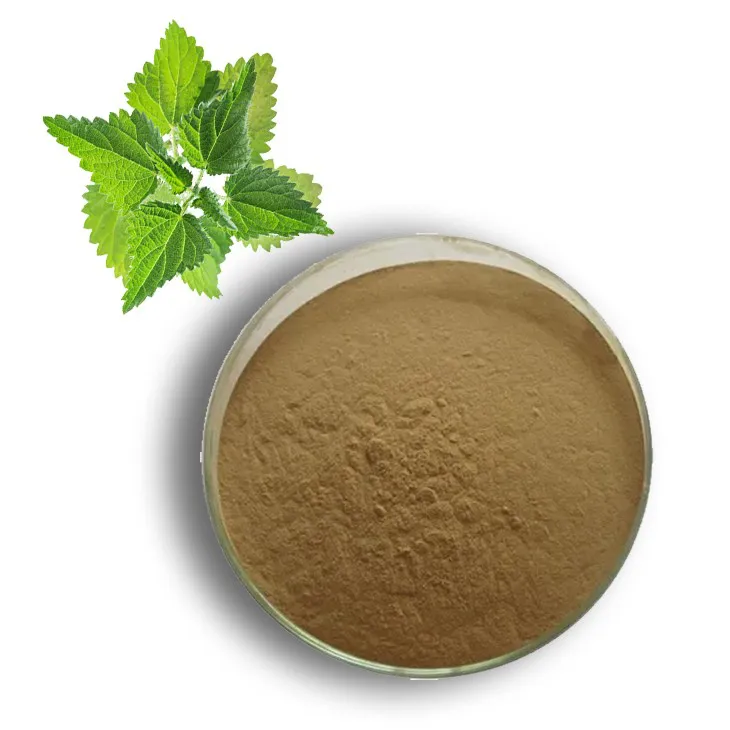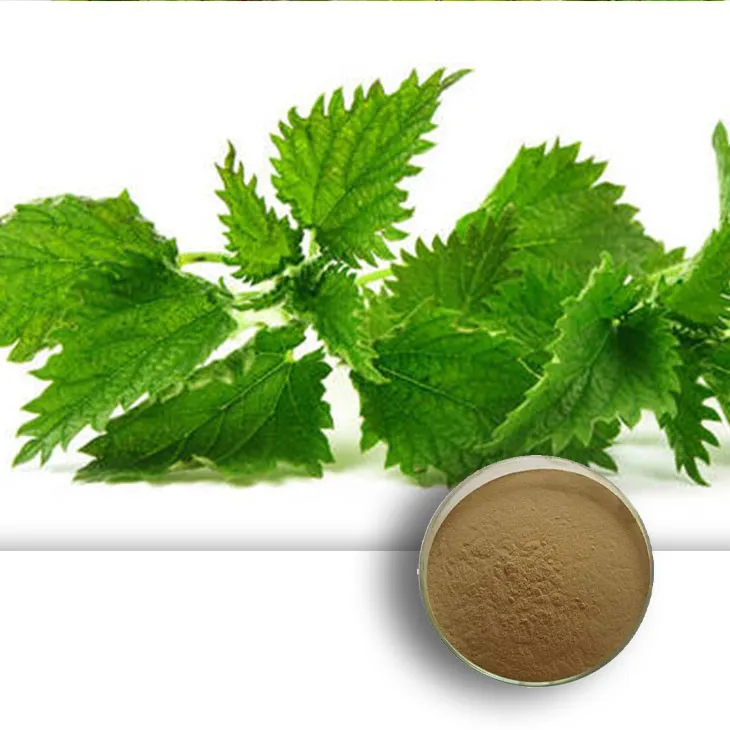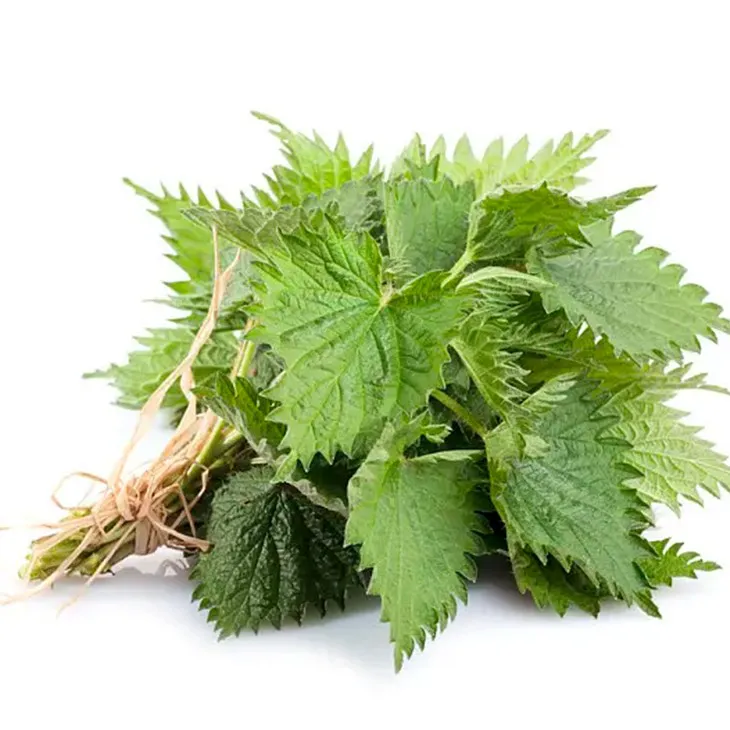- 0086-571-85302990
- sales@greenskybio.com
Best Nettle Leaf Extract: A Guide to Selecting the Best Nettle Leaf Extract
2024-11-13

Introduction
Nettle leaf extract has gained significant popularity in recent years due to its potential health benefits. It is used in various applications, from traditional medicine to modern wellness trends. However, not all Nettle leaf extracts are created equal. This article will serve as a comprehensive guide to help you select the best Nettle leaf extract for your specific needs.

Understanding Nettle Leaf
Nettle (Urtica dioica) is a perennial plant that has been used for centuries in traditional medicine. The leaves of the nettle plant are rich in various bioactive compounds, which are responsible for its potential health - promoting properties.
Botanical Features
Nettle leaves are typically heart - shaped and have a serrated edge. They are covered with tiny hairs that can cause a stinging sensation when touched. These hairs contain formic acid, histamine, and other substances that can irritate the skin.
Geographical Distribution
Nettle plants are widespread and can be found in many parts of the world, including Europe, Asia, and North America. The quality of nettle leaves may vary depending on the geographical location, soil conditions, and climate.

Quality of Raw Materials
The quality of the raw nettle leaves used to produce the extract is of utmost importance. Here are some factors to consider:
Source and Origin
- Wild - harvested vs. Cultivated: Wild - harvested nettle leaves may be more potent in some cases, as they grow in their natural environment without the use of pesticides or fertilizers. However, it is crucial to ensure that they are harvested sustainably to avoid over - exploitation. Cultivated nettle, on the other hand, can be grown under controlled conditions, ensuring a consistent supply. But, the use of chemicals in cultivation should be carefully monitored.
- Geographical Region: As mentioned earlier, the region where the nettle is grown can impact its quality. For example, nettle leaves grown in areas with clean air and water, and rich soil may contain higher levels of beneficial compounds.
Harvesting Time
- The time of harvesting can significantly affect the quality of nettle leaves. Young nettle leaves, usually harvested in the spring, are often considered to be of higher quality. They tend to have a higher concentration of bioactive compounds compared to older leaves.
- Harvesting should be done at the right stage of growth to ensure maximum potency. Leaves that are too young may not have fully developed their beneficial compounds, while over - mature leaves may have started to degrade.

Processing Methods
The way nettle leaves are processed into an extract can also influence its quality and effectiveness.
Extraction Solvents
- Alcohol - based Extraction: Alcohol is a commonly used solvent for extracting nettle leaf compounds. Ethanol, in particular, is often preferred as it can effectively extract a wide range of bioactive substances such as flavonoids, phenolic acids, and terpenoids. However, the concentration of alcohol used can vary, and it is important to note that higher alcohol concentrations may not be suitable for all applications.
- Water - based Extraction: Water can also be used to extract nettle leaf extract. This method is often considered more natural and may be preferred for those who want to avoid alcohol - based products. However, water - based extracts may have a different profile of bioactive compounds compared to alcohol - based ones. Some water - insoluble compounds may not be effectively extracted using water alone.
- Combination of Solvents: Some manufacturers may use a combination of solvents, such as a mixture of alcohol and water, to achieve a more comprehensive extraction of nettle leaf compounds. This can potentially result in an extract that contains a broader range of bioactive substances.
Filtration and Purification
- After extraction, the nettle leaf extract may undergo filtration and purification processes. Filtration helps to remove any solid particles, such as plant debris, from the extract. This results in a cleaner and more stable product.
- Purification may involve additional steps to remove impurities or unwanted substances. For example, some manufacturers may use chromatography techniques to isolate specific bioactive compounds, enhancing the purity and potency of the extract.
Bioactive Compounds in Nettle Leaf Extract
Understanding the bioactive compounds present in nettle leaf extract is essential for evaluating its potential benefits.
Flavonoids
- Flavonoids are a group of polyphenolic compounds that are abundant in nettle leaf extract. They have antioxidant properties, which means they can help protect the body against oxidative stress. Oxidative stress is associated with various diseases, including cancer, heart disease, and neurodegenerative disorders.
- Some of the flavonoids found in nettle leaves include Quercetin, kaempferol, and rutin. These compounds may also have anti - inflammatory effects, which can be beneficial for conditions such as arthritis and allergies.
Phenolic Acids
- Phenolic acids are another class of bioactive compounds in nettle leaf extract. They contribute to the antioxidant activity of the extract and may also have antimicrobial properties. For example, caffeic acid and ferulic acid are phenolic acids found in nettle leaves that may help fight against bacteria and fungi.
- These compounds may also play a role in modulating the body's immune system. By interacting with immune cells, phenolic acids may enhance the body's ability to defend against infections.
Terpenoids
- Terpenoids are a diverse group of compounds that can have various biological activities. In nettle leaf extract, terpenoids may contribute to its anti - inflammatory and analgesic (pain - relieving) properties. Some terpenoids may also have insect - repellent properties, which is one of the reasons why nettle plants are less likely to be attacked by insects.
- Examples of terpenoids found in nettle leaves include beta - sitosterol and stigmasterol. These compounds may also have potential benefits for cholesterol management as they can interfere with cholesterol absorption in the intestine.
Applications of Nettle Leaf Extract
Nettle leaf extract has a wide range of applications, both in traditional medicine and modern wellness trends.
Traditional Medicine
- Treatment of Arthritis: In traditional medicine, nettle leaf extract has been used to relieve the symptoms of arthritis. The anti - inflammatory properties of the extract may help reduce joint pain and swelling. It may be applied topically or taken orally for this purpose.
- Allergy Relief: Nettle leaf extract may also be used to alleviate allergy symptoms. It is believed to work by reducing histamine release in the body. Histamine is a substance that is released during an allergic reaction and causes symptoms such as itching, sneezing, and runny nose.
- Urinary Tract Health: Nettle leaves have diuretic properties, which means they can increase urine production. In traditional medicine, nettle leaf extract has been used to promote urinary tract health, including the treatment of urinary tract infections and kidney stones.
Modern Wellness Trends
- Skin Health: Nettle leaf extract is increasingly being used in skincare products. Its antioxidant and anti - inflammatory properties may help protect the skin from damage caused by environmental factors such as UV radiation and pollution. It may also be beneficial for treating skin conditions such as eczema and acne.
- Hair Health: Nettle leaf extract can be used for hair health. It may help improve hair growth, strengthen hair follicles, and reduce hair loss. Some hair products now contain nettle leaf extract as an active ingredient.
- Nutritional Supplements: As a nutritional supplement, nettle leaf extract can provide a source of vitamins, minerals, and bioactive compounds. It may be taken to support overall health and well - being, especially for those who may not get enough nutrients from their diet.
How to Select the Best Nettle Leaf Extract
Based on the above factors, here are some tips for selecting the best nettle leaf extract:
Read the Label
- Ingredient List: Check the ingredient list carefully. Make sure that the extract is made from high - quality nettle leaves and that there are no added fillers or artificial ingredients. If possible, look for extracts that are organically sourced.
- Concentration of Bioactive Compounds: Some labels may indicate the concentration of specific bioactive compounds in the extract. Higher concentrations of flavonoids, phenolic acids, and terpenoids may indicate a more potent extract. However, it is important to note that different applications may require different levels of concentration.
Look for Certifications
- Organic Certification: If you prefer organic products, look for nettle leaf extract that has an organic certification. This ensures that the nettle leaves were grown without the use of synthetic pesticides, fertilizers, or genetically modified organisms (GMOs).
- Quality Assurance Certifications: Certifications such as Good Manufacturing Practice (GMP) can indicate that the product was manufactured under strict quality control standards. This can give you confidence in the purity and safety of the extract.
Consider the Brand Reputation
- Research the brand that produces the nettle leaf extract. Look for brands that have a good reputation for quality and customer service. Brands that have been in the market for a long time and have positive customer reviews are more likely to produce high - quality extracts.
- You can also check if the brand is involved in any research or development related to nettle leaf extract. Brands that are committed to scientific research may be more likely to produce effective and safe products.
Conclusion
Selecting the best nettle leaf extract requires careful consideration of various factors, including the quality of raw materials, processing methods, and the presence of bioactive compounds. By understanding these factors and following the tips provided in this article, you can make an informed decision when choosing a nettle leaf extract for your specific needs, whether it is for traditional medicine applications or to keep up with modern wellness trends.
FAQ:
What factors should be considered when choosing nettle leaf extract?
When choosing nettle leaf extract, several factors should be considered. Firstly, the quality of the raw materials is crucial. High - quality nettle leaves, preferably organically grown, are more likely to produce a superior extract. Secondly, the processing method matters. Different processing techniques can affect the composition and potency of the extract. Additionally, the presence of bioactive compounds such as flavonoids, phenolic acids, and polysaccharides should be taken into account as these contribute to the potential health benefits of the extract.
How can one determine the quality of nettle leaf extract?
To determine the quality of nettle leaf extract, one can look at several aspects. Check for certifications related to the quality of the raw materials, such as organic certifications. Analyze the label for information on the extraction process, for example, if it is a cold - extraction method which may preserve more bioactive compounds. Also, look for third - party testing results which can verify the purity and potency of the extract. The presence of a clear and detailed ingredient list is also a sign of a high - quality product.
What are the main bioactive compounds in nettle leaf extract?
The main bioactive compounds in nettle leaf extract include flavonoids, phenolic acids, and polysaccharides. Flavonoids have antioxidant properties and can help protect cells from damage. Phenolic acids also contribute to the antioxidant activity and may have anti - inflammatory effects. Polysaccharides can play a role in immune modulation and may have potential benefits for overall health.
Can nettle leaf extract be used for both traditional medicine and modern wellness?
Yes, nettle leaf extract can be used for both traditional medicine and modern wellness. In traditional medicine, nettle has been used for various ailments such as arthritis, allergies, and skin conditions. In modern wellness trends, it is often used for its antioxidant, anti - inflammatory, and immune - boosting properties. It can be incorporated into dietary supplements, skincare products, and herbal teas for different health and wellness purposes.
How should nettle leaf extract be stored?
Nettle leaf extract should be stored in a cool, dry place away from direct sunlight. It is best to keep it in an airtight container to prevent oxidation and degradation. Following the storage instructions provided on the product label is also important to maintain its quality and potency over time.
Related literature
- The Bioactive Compounds in Nettle Leaf and Their Health Benefits"
- "Quality Assessment of Nettle Leaf Extracts: A Comprehensive Review"
- "Nettle Leaf Extract in Traditional and Modern Medicine"
- ▶ Hesperidin
- ▶ citrus bioflavonoids
- ▶ plant extract
- ▶ lycopene
- ▶ Diosmin
- ▶ Grape seed extract
- ▶ Sea buckthorn Juice Powder
- ▶ Beetroot powder
- ▶ Hops Extract
- ▶ Artichoke Extract
- ▶ Reishi mushroom extract
- ▶ Astaxanthin
- ▶ Green Tea Extract
- ▶ Curcumin Extract
- ▶ Horse Chestnut Extract
- ▶ Other Problems
- ▶ Boswellia Serrata Extract
- ▶ Resveratrol Extract
- ▶ Marigold Extract
- ▶ Grape Leaf Extract
- ▶ blog3
- ▶ blog4
- ▶ blog5
-
Organic Tongkat Ali extract powder factory.
2024-11-13
-
How to make powder with ashwagandha extract.
2024-11-13
-
Rosehip extract manufacturers from China.
2024-11-13
-
The best cat's claw extract in nature.
2024-11-13
-
Chinese Dandelion Leaf Extract Suppliers.
2024-11-13
-
Epimedium extract powder
2024-11-13
-
Kidney Bean Extract
2024-11-13
-
Stevia Extract
2024-11-13
-
Red Vine Extract
2024-11-13
-
Apricot Powder
2024-11-13
-
Mangosteen extract powder
2024-11-13
-
Thunder God Vine Extract
2024-11-13
-
Lavender Extract
2024-11-13
-
Reishi mushroom extract
2024-11-13
-
Tongkat Ali Extract
2024-11-13





















